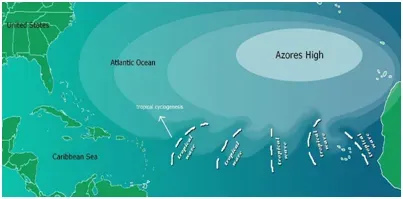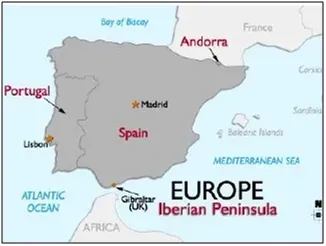

Context
The UK had its hottest night on record and was preparing for record-breaking daytime temperatures. From the perspective of Europe, these record highs are unprecedented.
About
- Britain experienced the country’s warmest-ever night on July 19, 2022, and braced for a day when temperatures are forecast to hit 40° Celsius (104° Fahrenheit).
- Europe, a continent renowned for its rainy, temperate climate, is being scorched by the current heat wave.
- According to the U.K.'s Met Office weather agency, the provisional figures are showing to remain above 25° C (77° F) overnight in parts of the country for the first time.
Why is the UK getting so hot?
- Azores Highs: The driver for the hot weather is the Azores High stretching into Britain from the Atlantic, and this is also known as the ‘Bermuda High’. The other reason is climate change.
- Climate Change: If someone has to be blamed for such a record-high temperature in the region, it has to be Climate change.
- This is taking place at a time when global average temperatures have only increased by slightly more than 1 degree Celsius from pre-industrial levels in many regions of the world.
- One degree doesn't sound much, but we're living in the hottest period for 125,000 years, according to the UN's climate science body, the Intergovernmental Panel on Climate Change (IPCC).
- The greenhouse gas emissions by the burning of fossil fuels trap heat in our atmosphere, resulting in increased concentration of carbon dioxide in the atmosphere to the highest levels seen for 2 million years.
About 'Azores High' pressure system:
- Azores High, also called Bermuda High, Azores anticyclone, or b, large persistent atmospheric high-pressure centre that develops over the subtropical region of the eastern North Atlantic Ocean during the winter and spring seasons in the Northern Hemisphere.

How is this phenomenon resulting in high temperature?
- The Azores High is also known as North Atlantic (Subtropical) High/Anticyclone or the Bermuda-Azores High.
- It is a subtropical area of high pressure that is known as the Bermuda High and flows westward in the summer and fall, just before winter.
- The Bermuda High is often associated with warm humid weather in the eastern United States during the summer months.
- A large region of the Atlantic Ocean, from the Caribbean to a collection of Portuguese islands about 1,000 miles from the mainland, is covered by the high-pressure system known as the Bermuda or Bermuda-Azores High.
- It may affect a large portion of the weather in the western globe by relocating tropical storms from the Atlantic basin to the Caribbean, Mexico, Central America, and the southern United States. Afterward, as far east as the United Kingdom, Western Europe, and northwest Africa.
- The semi-permanent system is busiest in the summer.
Effects of Azores High:
- The Iberian Peninsula has seen a yearly drying of 5–10 millimeters per year every decade throughout the second half of the 20th century. By the end of the twenty-first century, another 10–20% decrease in winter precipitation is anticipated.
- The weather will gradually become “drier, brighter, and warmer in the coming months.
- The Iberian region's agriculture is among the most susceptible in Europe as a result of these anticipated changes. The study projected:
- Olive-growing regions in southern Spain will suffer a 30% decline in production by 2100.
- Cultivation areas in grape-growing regions across the Iberian Peninsula will shrink 25% - 99% by 2050 due to severe water deficits that will render land unsuitable for viticulture.
|
Iberian Peninsula:
|

Challenges:
- Infrastructure designed for mild climate: Britain's transport infrastructure, some of it dating from Victorian times, “ just wasn't built to withstand this type of temperature.
- Years will pass before the current infrastructure is replaced with something that can survive the intense heat.
- Increasing frequency of extreme weather events: Experts on climate change caution that the frequency of extreme weather occurrences has risen due to global warming.
- The likelihood of temperatures in the U.K. reaching 40° C (104° F) is now 10 times higher than in the pre-industrial era.
- Wild Fires: The effects of climate change-related heat waves and droughts have made fighting wildfires more difficult.
- Since flames started a week ago in tinder-dry pine forests, thousands of people have had to leave their homes.
- The impacted area is growing: In addition to northern Europe, southern Europe has been hit by hot weather, which has caused wildfires in France, Portugal, and Spain.
- Air conditioning: In the UK, less than 5% of residences have air conditioning. In stark contrast, the figure in the United States is over a staggering 90%.
- Lack of cooling centers: During heat waves, air-conditioned cooling centers can save lives for those in need, but they are essentially nonexistent in the United Kingdom.
- House Design:46 percent of English homes were constructed between 1930 and 1982, and one in six were built before 1900, according to U.K. government statistics.
- Since many older homes are made of brick and have few or no air holes, installing air conditioning in them becomes more difficult and costly.
- Poor Urban Planning: “ The "Urban Heat Island Effect" intensifies the already oppressive heat, and this issue could get worse as housing demand drives up property development in large British cities and green space gets further depleted.
- Transportation: Britain has a few of the oldest operating railways in the world; the London Underground was established in 1863, and many of the trains are decades old; seven lines are still without air conditioning.
Conclusion
The government of the United Kingdom should reorganize buildings and towns to encourage "passive" ways of cooling—such as insulation, shade, and tree planting—instead of energy-guzzling cooling equipment in order to meet its goal of net zero and control high temperature occurrences. Many policies and targets have been set by the government, but if prompt actions are not taken, there is "scant evidence" that these goals will be achieved.



